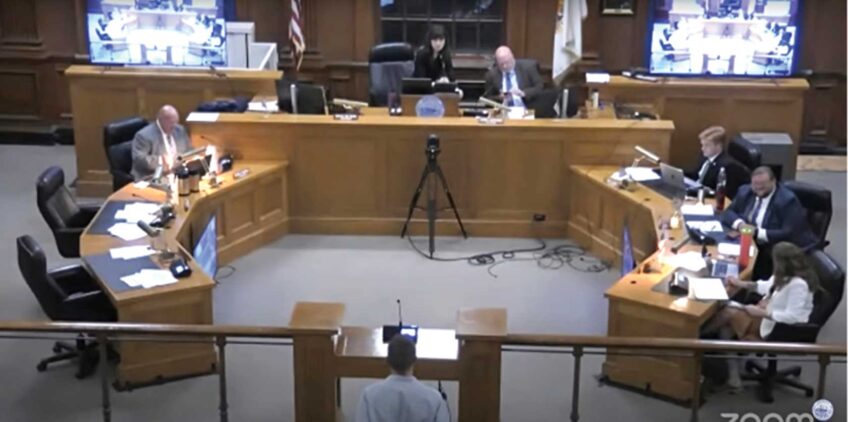When legislators passed a long-debated supplement to the state budget this month, they reinstated a program extending food assistance to immigrants in Massachusetts.
The supplemental budget, signed by Gov. Maura Healey on Dec. 5, allocated $6 million in funding to extend Supplemental Nutrition Assistance Program (SNAP) benefits to all legal immigrants in Massachusetts who are otherwise eligible for the program.
The move simplifies a complex system of access that varies based on immigration status. The existing system extends SNAP benefits to immigrants with certain qualified statuses but denies them to others who might be in financially identical situations. The new funding will allow all who qualify financially to access the benefits.
“We were very, very pleased that the Legislature understood the crisis going on,” said Patricia Baker, a senior policy advocate at the Massachusetts Law Reform Institute, who had pushed for reforms.
Specifics around the implementation of the expansion are still up in the air as the state’s Department of Transitional Assistance, which handles SNAP benefits, makes system changes so it can issue benefits and expand its roster.
The department anticipates having all necessary changes in place by spring and plans to issue retroactive payments back to the signing date, a department spokesman said.
Immigrant access to food assistance was limited by federal legislation in 1996 that restricted access to the program for most immigrants who had been in the country for less than five years. Under those federal rules, some limited exceptions exist, for instance, immigrants in the United States under statuses such as refugee or victim of trafficking, or immigrants from certain countries with special allowances like Haiti or Cuba.
Naomi Meyer, an attorney at Greater Boston Legal Services, said the system is generally designed to exclude people.
“It’s more like a system that’s meant to exclude everybody and then there are some special allowances for certain countries due to recognized extreme circumstances,” she said.
Massachusetts was one of six states that continued to extend state food assistance benefits to all income-qualifying immigrants after the 1996 federal restrictions, but that was discontinued in 2002.
Without the benefits, families often struggle when they first arrive, said Xan Weber, chief advancement officer and senior vice president of the International Institute of New England. The benefits can help families before they get work authorization and a way to earn income.
“They’re here legally, we’ve admitted them to the U.S., we’ve welcomed them here,” Weber said. “We really, really need to be able to give them enough support to survive, particularly in their first phase in the U.S., because often people are allowed in, but because of a lack of access to resources, work authorization and basic support, they can really fall through the gaps.”
The complex set of requirements around immigration status and country of origin can mean some refugees arrive with immediate access to support, but other immigrants have to wait.
“More and more, in our work that is supporting newly-arrived refugees and immigrants, we’re finding that we have a lot of benefits and options for one family and none for another family, and those families have almost the exact same needs,” Weber said.
Even those who get work authorization may not be able to feed a family without food assistance, said Baker.
“Eventually people do get work authorization, and they do work — and they’re very much desperate to work — but the jobs they get are often very entry-level, low-paying, minimum-wage jobs and they have kids and they can’t make ends meet without access to SNAP benefits,” she said.
While advocates celebrated the new expansion, which circumvents those complexities, questions remain about how much impact $6 million can have.
“What we don’t know yet is exactly what the numbers will be and how long that money will last,” Meyer said.
The pending availability of the benefits is bringing hope to immigrants. Meyer recalled a client from Nicaragua whom she helped to apply last week. The client is in the United States under humanitarian parole but is still waiting for her work permit and has no way of earning an income. When Meyer told the woman that she would at least temporarily get food stamps, the woman was thrilled, she said.
Weber said the change should reduce the burden felt by food pantries that often serve immigrant families who can’t access SNAP benefits. But she said challenges may arise when the expansion through the supplemental budget ends after a relatively short period of time in June, at the close of the fiscal year.
“I just imagine people getting more comfortable with being able to have enough on their plate, enough to eat, and then that falling apart in July if we don’t renew the benefits,” she said.
That’s why advocates said the next six months offer an opportunity to collect data about the impact and need around extending these benefits to immigrants, with the goal of reestablishing it as part of the annual budget.
“Our hope is there will be sufficient money for the next couple of months, hopefully through June, to make sure that the people who are most in need qualify,” Baker said. “Our broader hope is that this is really an opportunity to document the need and the unmet need and that the governor puts in her [budget recommendation], which she’s filing in January, sufficient funding to make this a permanent benefit in the state.”
The food assistance should go hand-in-hand with other support for immigrants in the state, Baker said, particularly as Massachusetts sees an influx of migrants and asylum-seekers.
A key piece of the supplemental budget, which caused delays as the two chambers of the State House worked out details, was $250 million in funding to support the state’s emergency shelter system as it grapples with a massive increase in migrants. In October, Healey announced the state’s emergency shelter system would be unable to accommodate new families, in large part due to migrants.
“SNAP food benefits don’t buy shelter. They’re not going to pay the rent; they’re not going to pay at hotels or motels or other emergency shelter,” Baker said.






